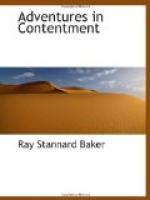“Why do I sell them?” and he looked still more perplexed. “To make money, of course; same reason you raise corn.”
“But here is wealth,” I said, pursuing my advantage. “If you have these you have something more valuable than money.”
Mr. Dixon politely said nothing. Like a wise angler, having failed to land me at the first rush, he let me have line. Then I thought of Ruskin’s words, “Nor can any noble thing be wealth except to a noble person.” And that prompted me to say to Mr. Dixon:
“These things are not yours; they are mine. You never owned them; but I will sell them to you.”
He looked at me in amazement, and then glanced around—evidently to discover if there were a convenient way of escape.
“You’re all straight, are you?” he asked tapping his forehead; “didn’t anybody ever try to take you up?”
“The covers are yours,” I continued as though I had not heard him, “the insides are mine and have been for a long time: that is why I proposed buying the covers separately.”
I opened his book again. I thought I would see what had been chosen for its pages. And I found there many fine and great things.
“Let me read you this,” I said to Mr. Dixon; “it has been mine for a long time. I will not sell it to you. I will give it to you outright. The best things are always given.”
Having some gift in imitating the Scotch dialect, I read:
“November chill blaws loud wi’
angry sugh;
The shortening winter day
is near a close;
The miry beasts retreating frae the pleugh;
The black’ning trains
o’ craws to their repose:
The toil-worn Cotter frae his labour goes,
This night his weekly moil
is at an end,
Collects his spades, his mattocks and
his hoes,
Hoping the morn in ease and
rest to spend,
And weary, o’er the moor, his course
does hameward bend.”
So I read “The Cotter’s Saturday Night.” I love the poem very much myself, sometimes reading it aloud, not so much for the tenderness of its message, though I prize that, too, as for the wonder of its music:
“Compared with these, Italian trills
are tame;
The tickl’d ear no heart-felt raptures
raise.”
I suppose I showed my feeling in my voice. As I glanced up from time to time I saw the agent’s face change, and his look deepen and the lips, usually so energetically tense, loosen with emotion. Surely no poem in all the language conveys so perfectly the simple love of the home, the quiet joys, hopes, pathos of those who live close to the soil.
When I had finished—I stopped with the stanza beginning:
“Then homeward all take off their sev’ral way”;
the agent turned away his head trying to brave out his emotion. Most of us, Anglo-Saxons, tremble before a tear when we might fearlessly beard a tiger.
I moved up nearer to the agent and put my hand on his knee; then I read two or three of the other things I found in his wonderful book. And once I had him laughing and once again I had the tears in his eyes. Oh, a simple young man, a little crusty without, but soft inside—like the rest of us.




